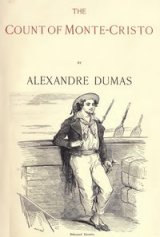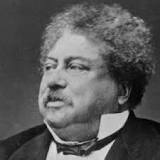The Count of Monte Cristo Page #28
The Count of Monte Cristo is an adventure novel by French author Alexandre Dumas completed in 1844. It is one of the author's most popular works, along with The Three Musketeers.
0141m “So then,” he exclaimed, turning pale with anger, “seven conjoined and allied armies overthrew that man. A miracle of heaven replaced me on the throne of my fathers after five-and-twenty years of exile. I have, during those five-and-twenty years, spared no pains to understand the people of France and the interests which were confided to me; and now, when I see the fruition of my wishes almost within reach, the power I hold in my hands bursts and shatters me to atoms!” “Sire, it is fatality!” murmured the minister, feeling that the pressure of circumstances, however light a thing to destiny, was too much for any human strength to endure. “What our enemies say of us is then true. We have learnt nothing, forgotten nothing! If I were betrayed as he was, I would console myself; but to be in the midst of persons elevated by myself to places of honor, who ought to watch over me more carefully than over themselves,—for my fortune is theirs—before me they were nothing—after me they will be nothing, and perish miserably from incapacity—ineptitude! Oh, yes, sir, you are right—it is fatality!” The minister quailed before this outburst of sarcasm. M. de Blacas wiped the moisture from his brow. Villefort smiled within himself, for he felt his increased importance. “To fall,” continued King Louis, who at the first glance had sounded the abyss on which the monarchy hung suspended,—“to fall, and learn of that fall by telegraph! Oh, I would rather mount the scaffold of my brother, Louis XVI., than thus descend the staircase at the Tuileries driven away by ridicule. Ridicule, sir—why, you know not its power in France, and yet you ought to know it!” “Sire, sire,” murmured the minister, “for pity’s——” “Approach, M. de Villefort,” resumed the king, addressing the young man, who, motionless and breathless, was listening to a conversation on which depended the destiny of a kingdom. “Approach, and tell monsieur that it is possible to know beforehand all that he has not known.” “Sire, it was really impossible to learn secrets which that man concealed from all the world.” “Really impossible! Yes—that is a great word, sir. Unfortunately, there are great words, as there are great men; I have measured them. Really impossible for a minister who has an office, agents, spies, and fifteen hundred thousand francs for secret service money, to know what is going on at sixty leagues from the coast of France! Well, then, see, here is a gentleman who had none of these resources at his disposal—a gentleman, only a simple magistrate, who learned more than you with all your police, and who would have saved my crown, if, like you, he had the power of directing a telegraph.” The look of the minister of police was turned with concentrated spite on Villefort, who bent his head in modest triumph. “I do not mean that for you, Blacas,” continued Louis XVIII.; “for if you have discovered nothing, at least you have had the good sense to persevere in your suspicions. Any other than yourself would have considered the disclosure of M. de Villefort insignificant, or else dictated by venal ambition.” These words were an allusion to the sentiments which the minister of police had uttered with so much confidence an hour before. Villefort understood the king’s intent. Any other person would, perhaps, have been overcome by such an intoxicating draught of praise; but he feared to make for himself a mortal enemy of the police minister, although he saw that Dandré was irrevocably lost. In fact, the minister, who, in the plenitude of his power, had been unable to unearth Napoleon’s secret, might in despair at his own downfall interrogate Dantès and so lay bare the motives of Villefort’s plot. Realizing this, Villefort came to the rescue of the crest-fallen minister, instead of aiding to crush him. “Sire,” said Villefort, “the suddenness of this event must prove to your majesty that the issue is in the hands of Providence; what your majesty is pleased to attribute to me as profound perspicacity is simply owing to chance, and I have profited by that chance, like a good and devoted servant—that’s all. Do not attribute to me more than I deserve, sire, that your majesty may never have occasion to recall the first opinion you have been pleased to form of me.” The minister of police thanked the young man by an eloquent look, and Villefort understood that he had succeeded in his design; that is to say, that without forfeiting the gratitude of the king, he had made a friend of one on whom, in case of necessity, he might rely. “’Tis well,” resumed the king. “And now, gentlemen,” he continued, turning towards M. de Blacas and the minister of police, “I have no further occasion for you, and you may retire; what now remains to do is in the department of the minister of war.” “Fortunately, sire,” said M. de Blacas, “we can rely on the army; your majesty knows how every report confirms their loyalty and attachment.” “Do not mention reports, duke, to me, for I know now what confidence to place in them. Yet, speaking of reports, baron, what have you learned with regard to the affair in the Rue Saint-Jacques?” “The affair in the Rue Saint-Jacques!” exclaimed Villefort, unable to repress an exclamation. Then, suddenly pausing, he added, “Your pardon, sire, but my devotion to your majesty has made me forget, not the respect I have, for that is too deeply engraved in my heart, but the rules of etiquette.” “Go on, go on, sir,” replied the king; “you have today earned the right to make inquiries here.” “Sire,” interposed the minister of police, “I came a moment ago to give your majesty fresh information which I had obtained on this head, when your majesty’s attention was attracted by the terrible event that has occurred in the gulf, and now these facts will cease to interest your majesty.” “On the contrary, sir,—on the contrary,” said Louis XVIII., “this affair seems to me to have a decided connection with that which occupies our attention, and the death of General Quesnel will, perhaps, put us on the direct track of a great internal conspiracy.” At the name of General Quesnel, Villefort trembled. “Everything points to the conclusion, sire,” said the minister of police, “that death was not the result of suicide, as we first believed, but of assassination. General Quesnel, it appears, had just left a Bonapartist club when he disappeared. An unknown person had been with him that morning, and made an appointment with him in the Rue Saint- Jacques; unfortunately, the general’s valet, who was dressing his hair at the moment when the stranger entered, heard the street mentioned, but did not catch the number.” As the police minister related this to the king, Villefort, who looked as if his very life hung on the speaker’s lips, turned alternately red and pale. The king looked towards him. “Do you not think with me, M. de Villefort, that General Quesnel, whom they believed attached to the usurper, but who was really entirely devoted to me, has perished the victim of a Bonapartist ambush?”
Translation
Translate and read this book in other languages:
Select another language:
- - Select -
- 简体中文 (Chinese - Simplified)
- 繁體中文 (Chinese - Traditional)
- Español (Spanish)
- Esperanto (Esperanto)
- 日本語 (Japanese)
- Português (Portuguese)
- Deutsch (German)
- العربية (Arabic)
- Français (French)
- Русский (Russian)
- ಕನ್ನಡ (Kannada)
- 한국어 (Korean)
- עברית (Hebrew)
- Gaeilge (Irish)
- Українська (Ukrainian)
- اردو (Urdu)
- Magyar (Hungarian)
- मानक हिन्दी (Hindi)
- Indonesia (Indonesian)
- Italiano (Italian)
- தமிழ் (Tamil)
- Türkçe (Turkish)
- తెలుగు (Telugu)
- ภาษาไทย (Thai)
- Tiếng Việt (Vietnamese)
- Čeština (Czech)
- Polski (Polish)
- Bahasa Indonesia (Indonesian)
- Românește (Romanian)
- Nederlands (Dutch)
- Ελληνικά (Greek)
- Latinum (Latin)
- Svenska (Swedish)
- Dansk (Danish)
- Suomi (Finnish)
- فارسی (Persian)
- ייִדיש (Yiddish)
- հայերեն (Armenian)
- Norsk (Norwegian)
- English (English)
Citation
Use the citation below to add this book to your bibliography:
Style:MLAChicagoAPA
"The Count of Monte Cristo Books." Literature.com. STANDS4 LLC, 2024. Web. 26 Nov. 2024. <https://www.literature.com/book/the_count_of_monte_cristo_34>.




Discuss this The Count of Monte Cristo book with the community:
Report Comment
We're doing our best to make sure our content is useful, accurate and safe.
If by any chance you spot an inappropriate comment while navigating through our website please use this form to let us know, and we'll take care of it shortly.
Attachment
You need to be logged in to favorite.
Log In